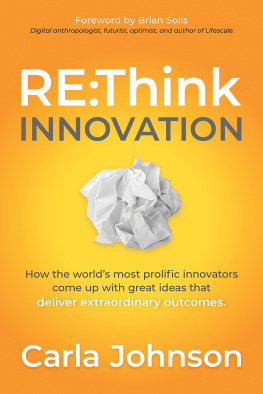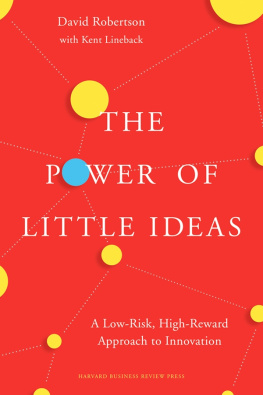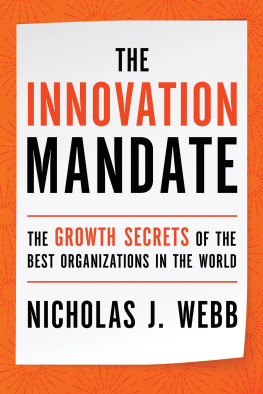GREAT INNOVATION
IDEAS
Howard Wright
Copyright 2012 Howard Wright
Cover art: Opal Works Pte Ltd
Published in 2012 by Marshall Cavendish Business
An imprint of Marshall Cavendish International
PO Box 65829
London EC1P 1NY, United Kingdom
and
1 New Industrial Road, Singapore 536196
www.marshallcavendish.com/genref
Other Marshall Cavendish offices: Marshall Cavendish International (Asia) Private Limited, 1 New Industrial Road, Singapore 536196 Marshall Cavendish Corporation. 99 White Plains Road, Tarrytown NY 10591-9001, USA Marshall Cavendish International (Thailand) Co Ltd. 253 Asoke, 12th Flr, Sukhumvit 21 Road, Klongtoey Nua, Wattana, Bangkok 10110, Thailand Marshall Cavendish (Malaysia) Sdn Bhd, Times Subang, Lot 46, Subang Hi-Tech Industrial Park, Batu Tiga, 40000 Shah Alam, Selangor Darul Ehsan, Malaysia
Marshall Cavendish is a trademark of Times Publishing Limited
The right of Howard Wright to be identified as the author of this work has been asserted by him in accordance with the Copyright, Designs and Patents Act 1988.
All rights reserved
No part of this publication may be reproduced, stored in a retrieval system or transmitted, in any form or by any means, electronic, mechanical, photocopying, recording or otherwise, without the prior permission of the copyright owner. Requests for permission should be addressed to the publisher.
The author and publisher have used their best efforts in preparing this book and disclaim liability arising directly and indirectly from the use and application of this book.
All reasonable efforts have been made to obtain necessary copyright permissions. Any omissions or errors are unintentional and will, if brought to the attention of the publisher, be corrected in future printings.
A CIP record for this book is available from the British Library
eISBN 978-981-4382-62-5
Printed and bound in Great Britain by CPI Mackays, Chatham ME5 8TD
CONTENTS
The ideas
Weekly innovation activity list
This book is dedicated to my wife, Lorna, for her encouragement and patience in helping me complete it.
I would also like to thank Maureen Gardiner for her inspiration and support.
INTRODUCTION
What is innovation?
Theres a way to do it better, find it.
Thomas Edison
There are many different theories that explain what innovation really is: radical, breakthrough, disruptive, incremental, open, hybrid are just a few that are discussed in the numerous books, websites and academic journals available today. There are arguments stating that an innovation has to have a disruptive effect to qualify as innovative; others argue that any change, as long as it is measurable, can be considered an innovation.
These different interpretations of innovation are typically based on perception as there is no definitive definition of the word which has become synonymous with new and change, although it can just as easily be applied to incremental and evolution. It is an inspirational word with many connotations and associations, and companies around the world include it in their marketing materials as well as in their reports and accounts. How individuals and companies define innovation can have a dramatic affect on how they measure success.
When every new product or service claims to be innovative, it becomes difficult to say what innovation really is. Simply stating that a new product/service/business model is innovative without a definitive definition makes it difficult to assess whether the assertion is true or merely a rehash of the old.
A quick search on Amazon (UK) brings up over 45,000 titles in hardcover, and more than 112,000 titles overall, that contain the word innovation. A Google search reveals 70 million websites that refer to the definition of innovation. Clearly, everyone seems to be talking about it but there seems to be a high degree of ambiguity and misunderstanding about the topic.
To try to make things a little clearer, I have put together six approaches that seem to be in common usage around the world.
1. Innovation is invention
Creativity is thinking up new things. Innovation is doing new things.
Theodore Levitt
For many, innovation is about invention and this is reflected in the Oxford English Dictionarys definition:
The introduction of novelties; the alteration of what is established by the introduction of new elements or forms. A change made in the nature or fashion of anything; something newly introduced; a novel practice, method, etc. The action of introducing a new product into the market; a product newly brought on to the market.
Although invention is clearly an element of innovation, it is only a part of it and the real benefits from innovation activities come from implementation making something real and deriving some form of value from the idea.
There is however, some confusion about the difference between innovation and creativity. Are they the same or fundamentally different? I like to use the Attitude Skill and Knowledge (ASK) Diagram, which attempts to identify the dimensions of these two areas.
Figure 1: ASK Diagram
The diagram shows that to be creative you do not need a huge amount of knowledge, just the skill to understand and apply the various techniques, and an attitude that allows you to do so. Anyone can come up with a new design for a car or a stamp, but without applying it, it would be just an idea.
Alternatively, it can be argued that innovativeness requires some knowledge about the industry, as it is the different applications of this knowledge that can make the breakthrough innovative.
To me, innovation is not a skill; it cannot be taught the way creativity techniques can. Instead it is more a state of mind, an attitude that allows people to use the knowledge and experience they have in new ways. The ability to find new ways of doing things is present in all of us, but it is the confidence to do something about it that sets true innovators apart from the rest.
2. Innovation is incremental change
Future economic prosperity depends on building a new, stronger foundation and recapturing the spirit of innovation.
President Obama (January 2011)
It is sometimes argued that innovation is not radical but instead denotes incremental improvements that can be capitalised on and turned into significant change for the organisation a bottom up approach. An example of this is Apple Inc. instead of inventing new things, Apple took a completely different view towards what was already there. For instance, it took the MP3 player and used its flair for design to create the iPod; similarly the iPad built on the existing tablet computers.
3. Innovation is the silver bullet the answer
Innovation is one of those activities that seems to go in and out of fashion, with companies investing and de-investing on a regular basis. When in vogue everything and everyone claims to be innovative.














